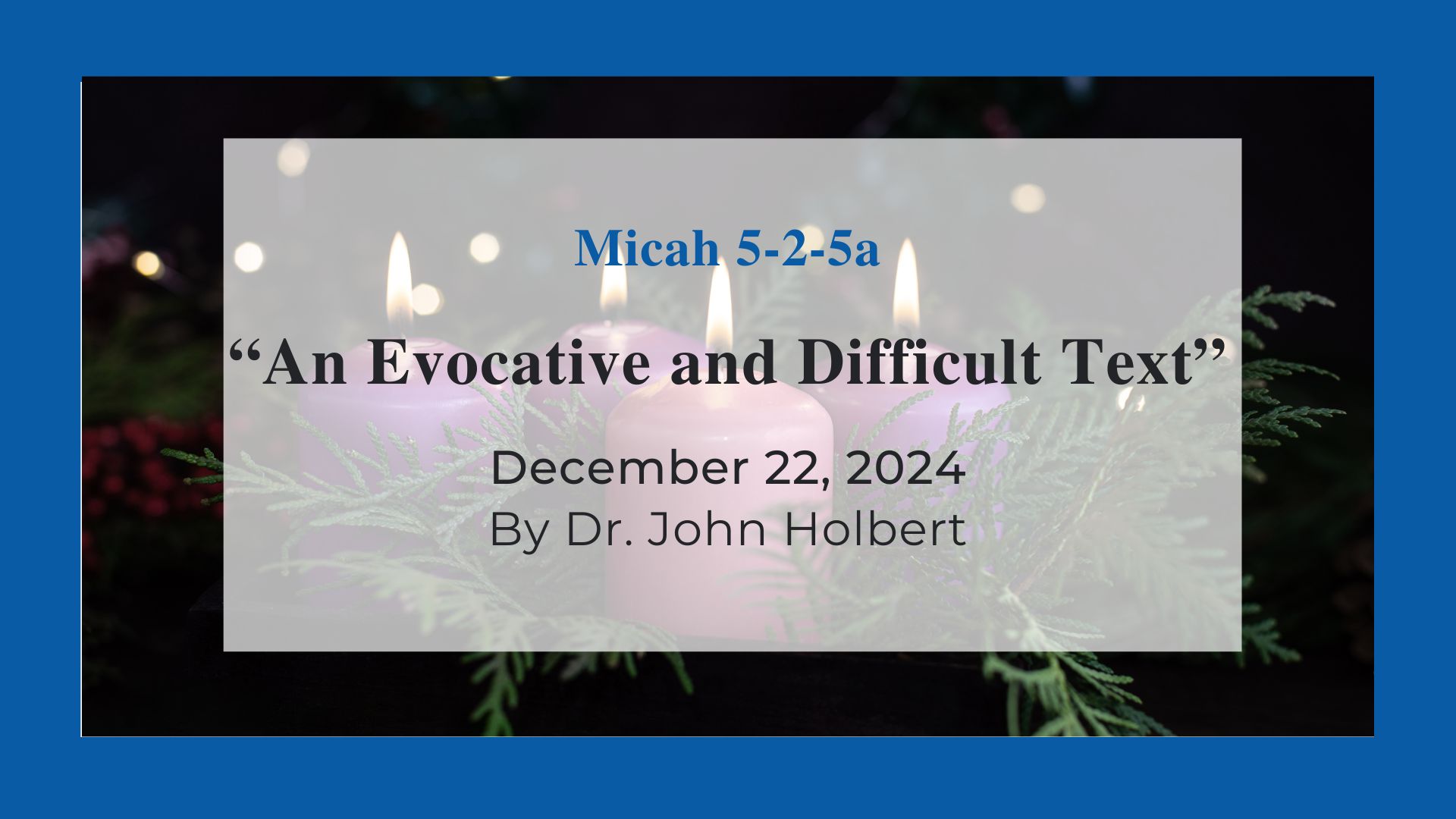An Evocative and Difficult Text - Reflections on Micah 5:2-5a for Advent 4, Year C
by John Holbert on Saturday, November 30, 2024

Micah 5:2-5a is a decidedly odd text. It ripples with grammatical problems, is rife with thematic peculiarities, but, despite all that, has long served as a “predictive” passage for the coming of Jesus Messiah. That much is obvious given a quick look at vs.2, which in Hebrew is in fact vs.1 of chapter 5: “Now you, Bethlehem, tiny Ephrathah, existing among the clans of Judah, from you shall come forth for me, one who shall rule over (or “in”) Israel.” Well, it is plain how the early Christians heard that passage: Jesus, born in Bethlehem of Judah is the promised one “who shall rule in Israel.” Thus, the 8th century BCE prophet predicted centuries before Jesus’s birth that his coming was certain long before it actually happened. And the next line of vs.1 made that a fact for them. “His origin is from of old (literally: “East”), from the time of ‘olam.” Two difficult words are found in this small verse. The word “east” was often used in the tradition to designate that place from which many ancient and divine experiences originated. For example, it was from the east that Israel had its beginnings through Abram and Sarai; it was the “east wind” that blew on Jonah to cause him his discomfort above the city of Nineveh; Job’s so-called comforters come from the east. Even in the New Testament tale of Matthew, the wise men come to worship the child from—where else?—the east. The second difficult word is ‘olam, a word meaning at least “a long time,” if not something akin to “eternity”. Its slippery sense can include either a long duration or antiquity or futurity. As such, it is the perfect word to describe the mysterious origin and promise of this unnamed one from Bethlehem.
But the peculiarities do not end in vs.1. Micah 5:2 (5:3 in English) reads: “Therefore he will give them up until the time when she who is in labor will give birth; then the rest of his kin will return to the children of Israel.” Goodness! What is to be made of that? Who is this “he,” and how shall he “give them up?” And who are the “them” he will give up? And a laboring woman is involved, a clear echo of Is.7:14 where the young woman conceives and gives birth to a son named Emmanuel; her birthing there is a signal for a political victory for Judah in the midst of an internecine 8th century struggle between Israel (along with the Arameans) and Judah. Is this Micah passage like that? Does the birth of the child signal the end of the activity of “he, the one who gives them up?” I admit to being bewildered by this language!
And I am hardly helped toward clarity by the next verse 3. “And he will stand and feed a flock by the power of YHWH, in the majesty of the name of YHWH his God. They shall live, because now he is (or “shall be”) great to the ends of the earth.” “He shall feed a flock,” while “they shall live.” If he is the unnamed one from Bethlehem, then who are the “they” who will live? Israel? Judah? The future people of God? Confusion and perplexity abound! And it all ends with a succeeding enigmatic short line: “And this one shall be shalom.”
Given the almost complete lack of clarity in these few lines, it does open up the multiple possibilities for later commentators to hear what they want to hear. Familiar themes of future greatness in YHWH are sounded here. Bethlehem is the origin of the coming one; his coming is (apparently) signaled by a laboring woman, as in Is.7. He will feed a flock, and they, (as a result?) will become great, and that one who has come will be in the end shalom, or “the one of peace,” as NRSV understands it, although the word shalom stands alone at the passage’s end.
Micah 5:2-5a has served as one of the places where the origins of Jesus have been heralded, though the text itself, as I have tried to show, is far from clear in its suppositions. Still, the themes of shepherd and laboring woman and peace are here, and those were enough, I conclude, to attract early Christians to the text as an announcement of the coming of Jesus Messiah. I should add that the claim that Ephrathah is “tiny” also added to the mix the smallness and unlikeliness that the Messiah would come from such a place as Bethlehem, despite the fact, of course, that the city was also the birthplace of David, Israel’s most revered king. Even this most peculiar and complex text served the Christians as one more ancient certainty that Jesus, the peasant poet, born in Bethlehem, in stable, or barn or cave, depending on the tradition used, was without doubt the Messiah of Israel, the savior of the world. And a Merry Christmas to one and all!
